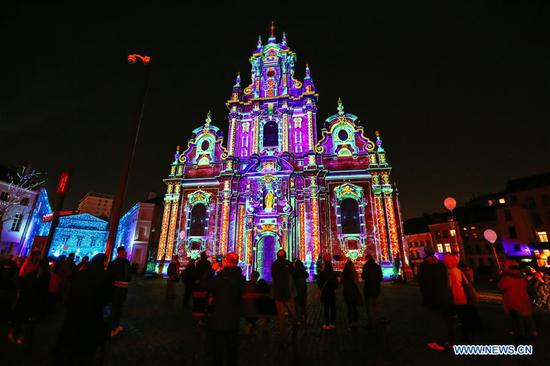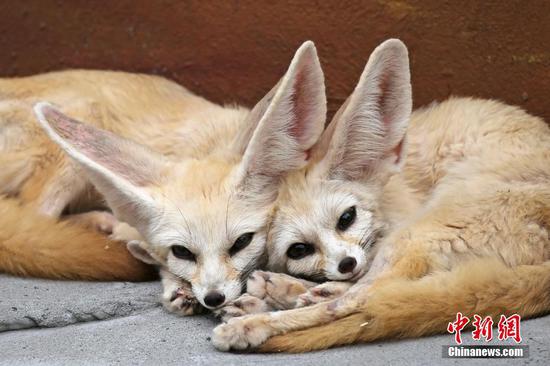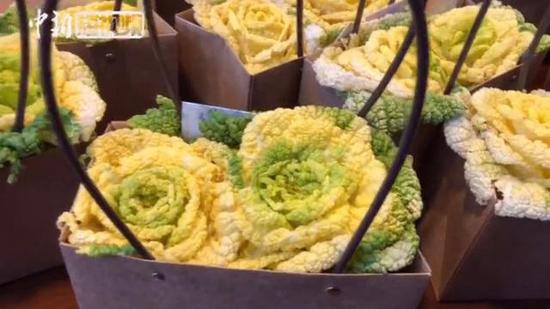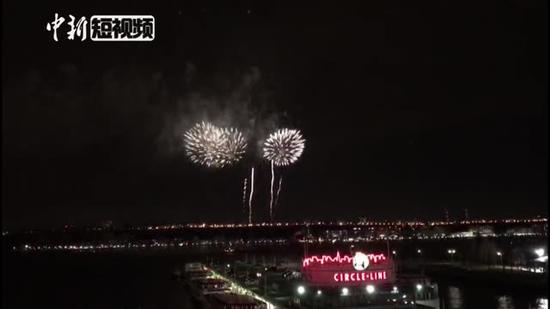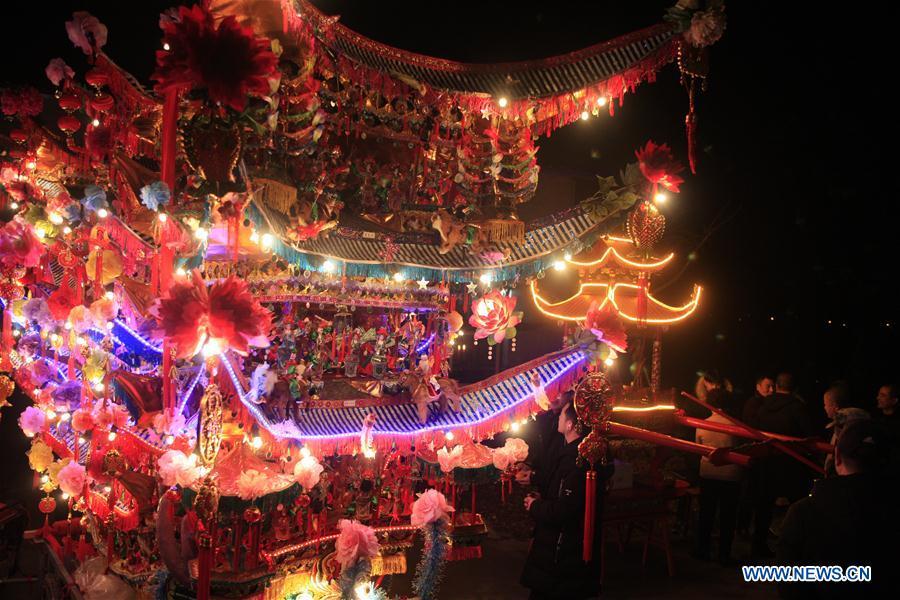
Villagers participate in the ornamental dragon parade in Xiliuzhai Village of Beibaixiang Town of Yueqing, east China's Zhejiang Province, Feb. 12, 2019. Having a history of more than 400 years, the ornamental dragon, a sacrifice to pray for good fortune during the period of Lantern Festival, is popular in villages of Yueqing City in Zhejiang Province. Lin Shunkui, an inheritor of the handicraft of ornamental dragon, is born in 1956 in Dongchan Village of Beibaixiang Town. Learning the art since he was young from his father, who is a master of fine paper-cutting, Lin has been in the walk for more than 40 years and has been famous for his exquisite handicraft. The making procedures of the ornamental dragon require high standards and needs preparation of more than half a year. The craftsman must be proficient in various vocations such as paper-cutting, carpentry, painting and machinery. Usually having a height of four meters, a length of three meters and a width of two meters, the ornamental dragon displays about 300 figures in more than 80 cabinets, which are driven by gears hidden inside the dragon body. The handicraft of ornamental dragon was listed as one of the national intangible cultural heritages in October of 2014. (Xinhua/Zhu Weixi)

Villagers participate in the ornamental dragon parade in Xiliuzhai Village of Beibaixiang Town of Yueqing, east China's Zhejiang Province, Feb. 12, 2019. Having a history of more than 400 years, the ornamental dragon, a sacrifice to pray for good fortune during the period of Lantern Festival, is popular in villages of Yueqing City in Zhejiang Province. Lin Shunkui, an inheritor of the handicraft of ornamental dragon, is born in 1956 in Dongchan Village of Beibaixiang Town. Learning the art since he was young from his father, who is a master of fine paper-cutting, Lin has been in the walk for more than 40 years and has been famous for his exquisite handicraft. The making procedures of the ornamental dragon require high standards and needs preparation of more than half a year. The craftsman must be proficient in various vocations such as paper-cutting, carpentry, painting and machinery. Usually having a height of four meters, a length of three meters and a width of two meters, the ornamental dragon displays about 300 figures in more than 80 cabinets, which are driven by gears hidden inside the dragon body. The handicraft of ornamental dragon was listed as one of the national intangible cultural heritages in October of 2014. (Xinhua/Zhu Weixi)
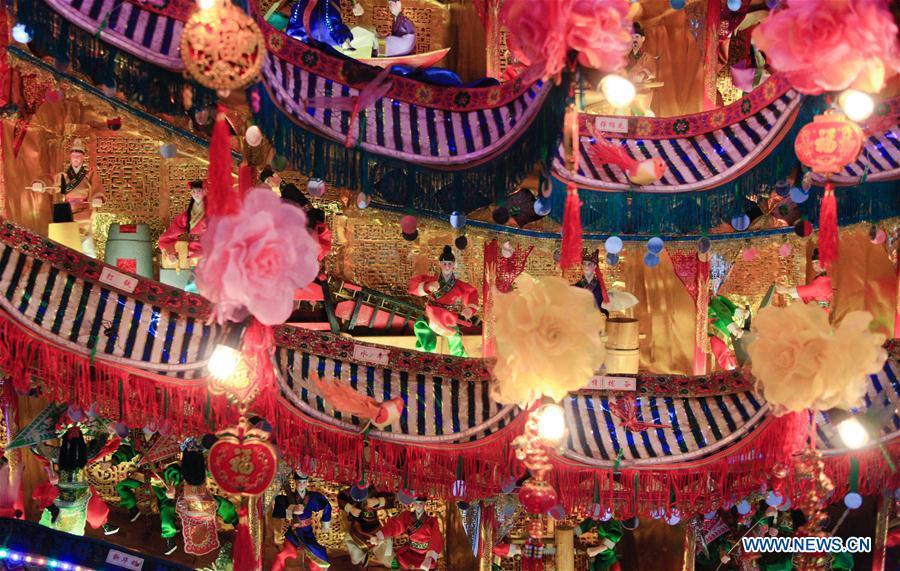
Photo taken on Feb. 11, 2019 shows figures on ornamental dragon in Beibaixiang Town of Yueqing, east China's Zhejiang Province. Having a history of more than 400 years, the ornamental dragon, a sacrifice to pray for good fortune during the period of Lantern Festival, is popular in villages of Yueqing City in Zhejiang Province. Lin Shunkui, an inheritor of the handicraft of ornamental dragon, is born in 1956 in Dongchan Village of Beibaixiang Town. Learning the art since he was young from his father, who is a master of fine paper-cutting, Lin has been in the walk for more than 40 years and has been famous for his exquisite handicraft. The making procedures of the ornamental dragon require high standards and needs preparation of more than half a year. The craftsman must be proficient in various vocations such as paper-cutting, carpentry, painting and machinery. Usually having a height of four meters, a length of three meters and a width of two meters, the ornamental dragon displays about 300 figures in more than 80 cabinets, which are driven by gears hidden inside the dragon body. The handicraft of ornamental dragon was listed as one of the national intangible cultural heritages in October of 2014. (Xinhua/Zhu Weixi)
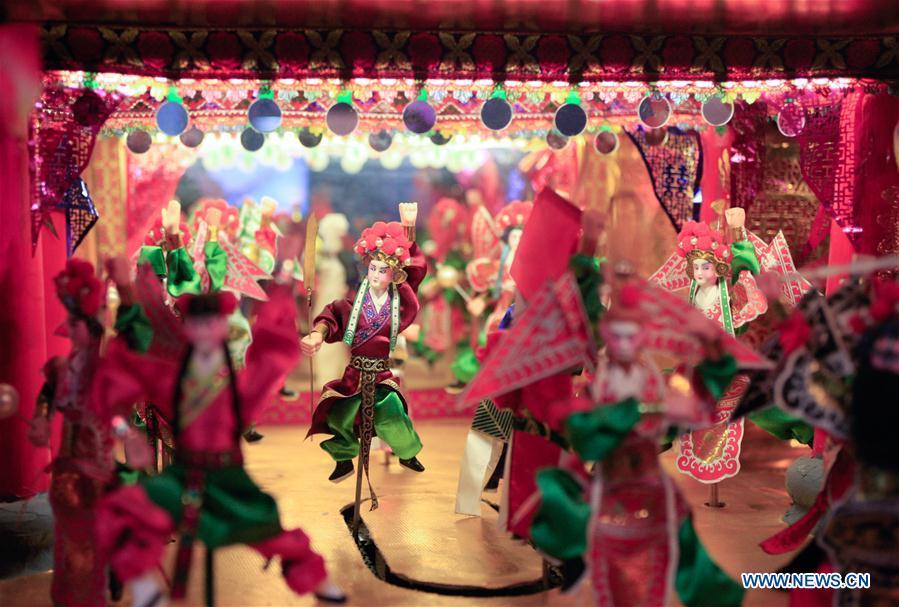
Photo taken on Feb. 11, 2019 shows figures on ornamental dragon in Beibaixiang Town of Yueqing, east China's Zhejiang Province. Having a history of more than 400 years, the ornamental dragon, a sacrifice to pray for good fortune during the period of Lantern Festival, is popular in villages of Yueqing City in Zhejiang Province. Lin Shunkui, an inheritor of the handicraft of ornamental dragon, is born in 1956 in Dongchan Village of Beibaixiang Town. Learning the art since he was young from his father, who is a master of fine paper-cutting, Lin has been in the walk for more than 40 years and has been famous for his exquisite handicraft. The making procedures of the ornamental dragon require high standards and needs preparation of more than half a year. The craftsman must be proficient in various vocations such as paper-cutting, carpentry, painting and machinery. Usually having a height of four meters, a length of three meters and a width of two meters, the ornamental dragon displays about 300 figures in more than 80 cabinets, which are driven by gears hidden inside the dragon body. The handicraft of ornamental dragon was listed as one of the national intangible cultural heritages in October of 2014. (Xinhua/Zhu Weixi)
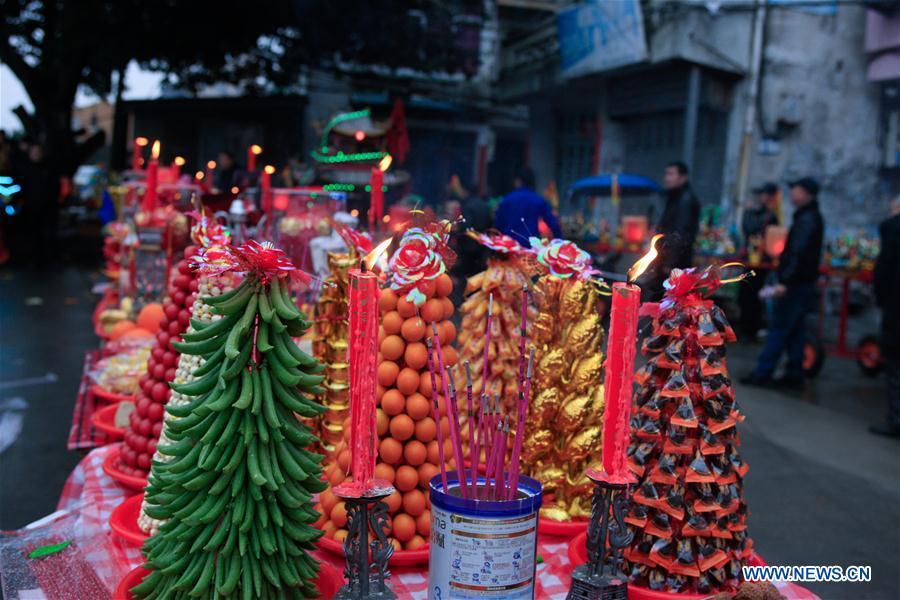
Photo taken on Feb. 11, 2019 shows sacrifices during the ornamental dragon parade in Gaoao of Beibaixiang Town of Yueqing, east China's Zhejiang Province. Having a history of more than 400 years, the ornamental dragon, a sacrifice to pray for good fortune during the period of Lantern Festival, is popular in villages of Yueqing City in Zhejiang Province. Lin Shunkui, an inheritor of the handicraft of ornamental dragon, is born in 1956 in Dongchan Village of Beibaixiang Town. Learning the art since he was young from his father, who is a master of fine paper-cutting, Lin has been in the walk for more than 40 years and has been famous for his exquisite handicraft. The making procedures of the ornamental dragon require high standards and needs preparation of more than half a year. The craftsman must be proficient in various vocations such as paper-cutting, carpentry, painting and machinery. Usually having a height of four meters, a length of three meters and a width of two meters, the ornamental dragon displays about 300 figures in more than 80 cabinets, which are driven by gears hidden inside the dragon body. The handicraft of ornamental dragon was listed as one of the national intangible cultural heritages in October of 2014. (Xinhua/Zhu Weixi)
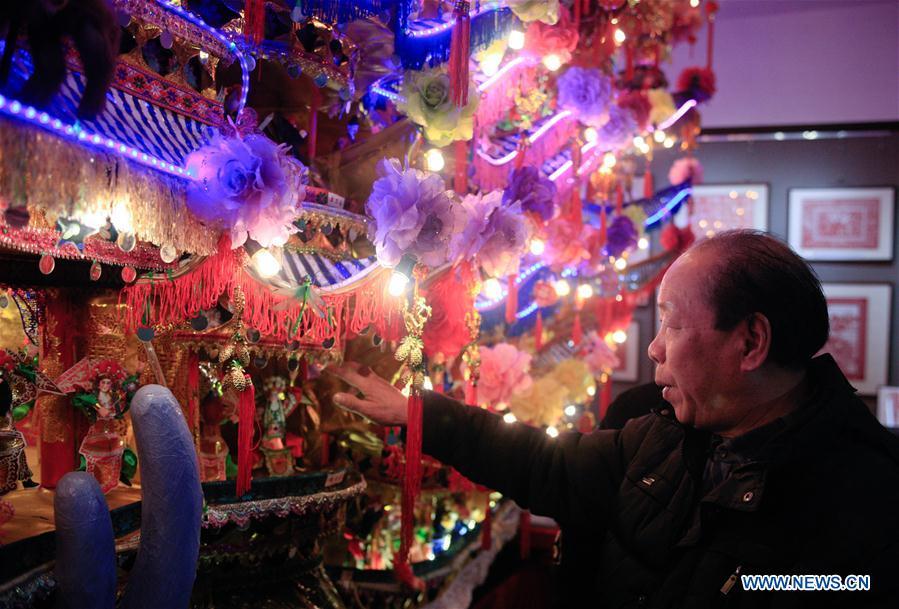
Lin Shunkui looks at his ornamental dragon at home in Beibaixiang Town of Yueqing, east China's Zhejiang Province, Feb. 11, 2019. Having a history of more than 400 years, the ornamental dragon, a sacrifice to pray for good fortune during the period of Lantern Festival, is popular in villages of Yueqing City in Zhejiang Province. Lin Shunkui, an inheritor of the handicraft of ornamental dragon, is born in 1956 in Dongchan Village of Beibaixiang Town. Learning the art since he was young from his father, who is a master of fine paper-cutting, Lin has been in the walk for more than 40 years and has been famous for his exquisite handicraft. The making procedures of the ornamental dragon require high standards and needs preparation of more than half a year. The craftsman must be proficient in various vocations such as paper-cutting, carpentry, painting and machinery. Usually having a height of four meters, a length of three meters and a width of two meters, the ornamental dragon displays about 300 figures in more than 80 cabinets, which are driven by gears hidden inside the dragon body. The handicraft of ornamental dragon was listed as one of the national intangible cultural heritages in October of 2014. (Xinhua/Zhu Weixi)
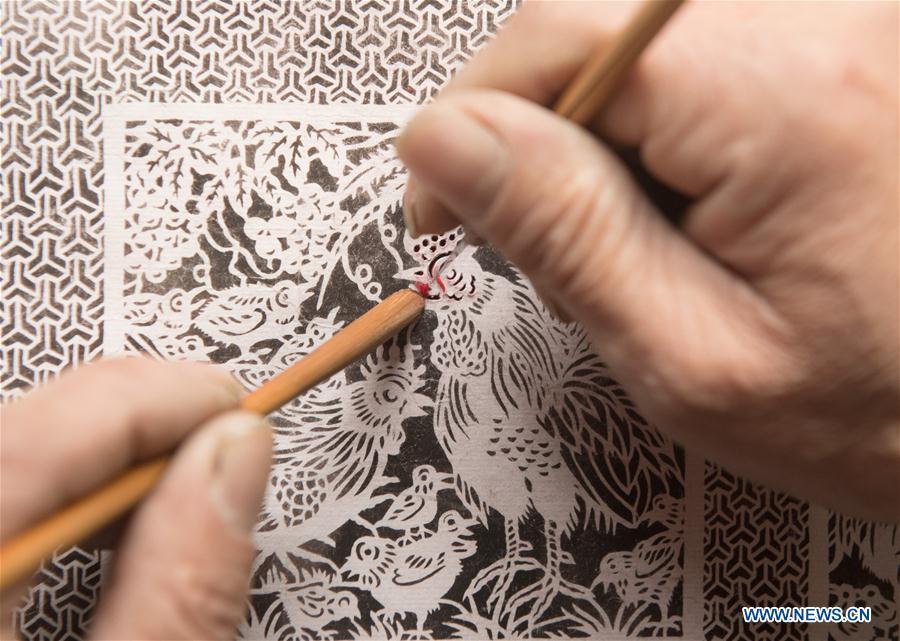
Lin Shunkui shows paper-cutting skills at home in Beibaixiang Town of Yueqing, east China's Zhejiang Province, Feb. 12, 2019. Having a history of more than 400 years, the ornamental dragon, a sacrifice to pray for good fortune during the period of Lantern Festival, is popular in villages of Yueqing City in Zhejiang Province. Lin Shunkui, an inheritor of the handicraft of ornamental dragon, is born in 1956 in Dongchan Village of Beibaixiang Town. Learning the art since he was young from his father, who is a master of fine paper-cutting, Lin has been in the walk for more than 40 years and has been famous for his exquisite handicraft. The making procedures of the ornamental dragon require high standards and needs preparation of more than half a year. The craftsman must be proficient in various vocations such as paper-cutting, carpentry, painting and machinery. Usually having a height of four meters, a length of three meters and a width of two meters, the ornamental dragon displays about 300 figures in more than 80 cabinets, which are driven by gears hidden inside the dragon body. The handicraft of ornamental dragon was listed as one of the national intangible cultural heritages in October of 2014. (Xinhua/Weng Xinyang)
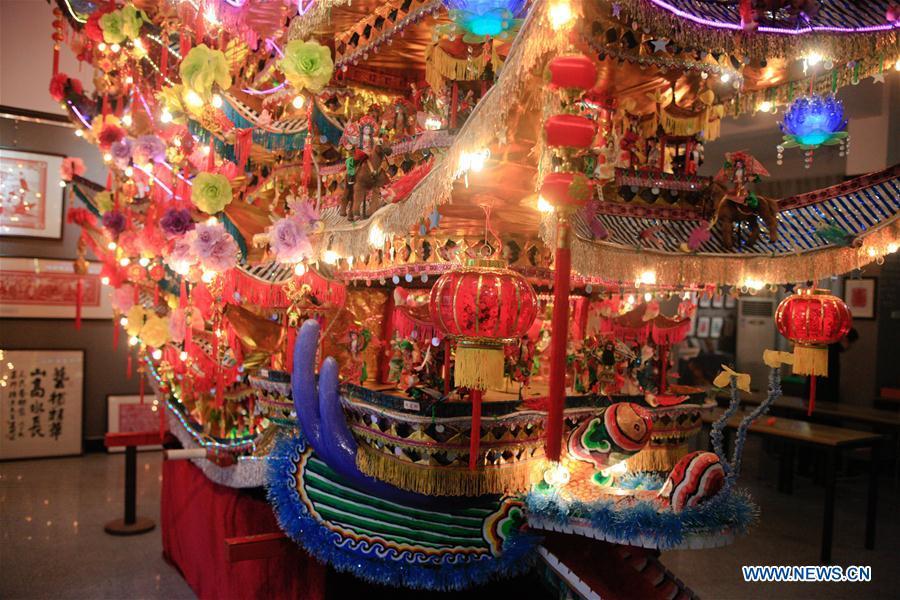
Photo shows the ornamental dragon at Lin Shunkui's home in Beibaixiang Town of Yueqing, east China's Zhejiang Province, Feb. 11, 2019. Having a history of more than 400 years, the ornamental dragon, a sacrifice to pray for good fortune during the period of Lantern Festival, is popular in villages of Yueqing City in Zhejiang Province. Lin Shunkui, an inheritor of the handicraft of ornamental dragon, is born in 1956 in Dongchan Village of Beibaixiang Town. Learning the art since he was young from his father, who is a master of fine paper-cutting, Lin has been in the walk for more than 40 years and has been famous for his exquisite handicraft. The making procedures of the ornamental dragon require high standards and needs preparation of more than half a year. The craftsman must be proficient in various vocations such as paper-cutting, carpentry, painting and machinery. Usually having a height of four meters, a length of three meters and a width of two meters, the ornamental dragon displays about 300 figures in more than 80 cabinets, which are driven by gears hidden inside the dragon body. The handicraft of ornamental dragon was listed as one of the national intangible cultural heritages in October of 2014. (Xinhua/Zhu Weixi)
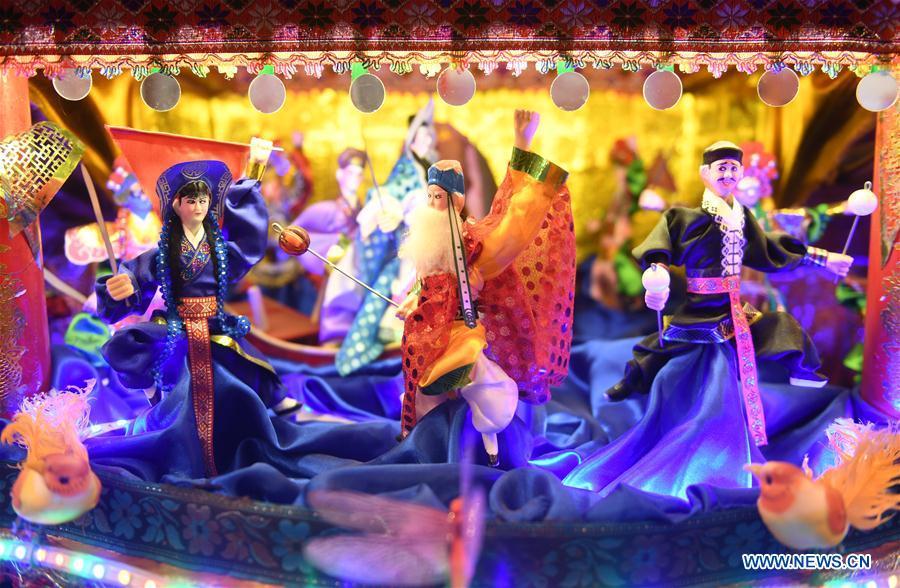
Photo taken on Feb. 11, 2019 shows figures on ornamental dragon in Beibaixiang Town of Yueqing, east China's Zhejiang Province. Having a history of more than 400 years, the ornamental dragon, a sacrifice to pray for good fortune during the period of Lantern Festival, is popular in villages of Yueqing City in Zhejiang Province. Lin Shunkui, an inheritor of the handicraft of ornamental dragon, is born in 1956 in Dongchan Village of Beibaixiang Town. Learning the art since he was young from his father, who is a master of fine paper-cutting, Lin has been in the walk for more than 40 years and has been famous for his exquisite handicraft. The making procedures of the ornamental dragon require high standards and needs preparation of more than half a year. The craftsman must be proficient in various vocations such as paper-cutting, carpentry, painting and machinery. Usually having a height of four meters, a length of three meters and a width of two meters, the ornamental dragon displays about 300 figures in more than 80 cabinets, which are driven by gears hidden inside the dragon body. The handicraft of ornamental dragon was listed as one of the national intangible cultural heritages in October of 2014. (Xinhua/Weng Xinyang)
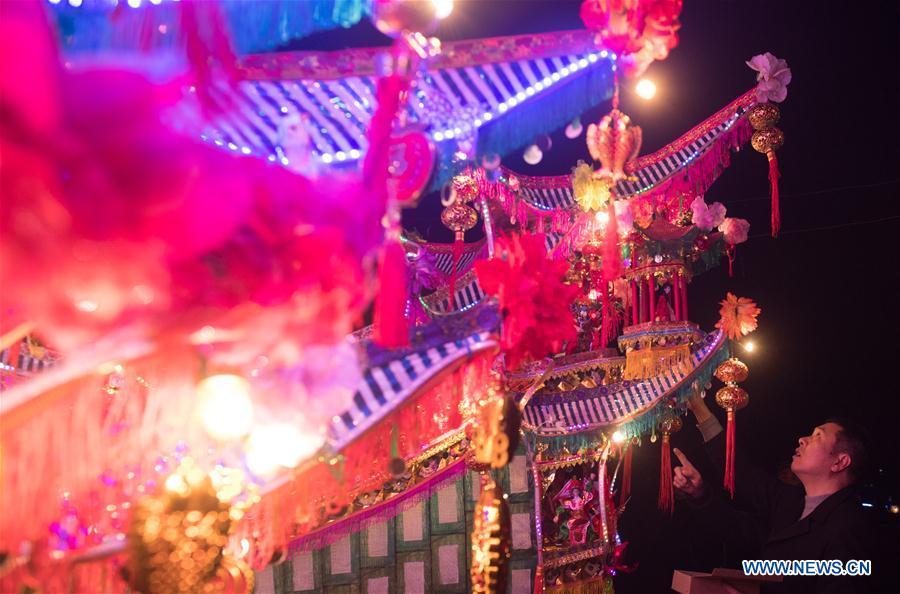
A villager checks ornamental dragon during parade in Xiliuzhai Village of Beibaixiang Town of Yueqing, east China's Zhejiang Province, Feb. 12, 2019. Having a history of more than 400 years, the ornamental dragon, a sacrifice to pray for good fortune during the period of Lantern Festival, is popular in villages of Yueqing City in Zhejiang Province. Lin Shunkui, an inheritor of the handicraft of ornamental dragon, is born in 1956 in Dongchan Village of Beibaixiang Town. Learning the art since he was young from his father, who is a master of fine paper-cutting, Lin has been in the walk for more than 40 years and has been famous for his exquisite handicraft. The making procedures of the ornamental dragon require high standards and needs preparation of more than half a year. The craftsman must be proficient in various vocations such as paper-cutting, carpentry, painting and machinery. Usually having a height of four meters, a length of three meters and a width of two meters, the ornamental dragon displays about 300 figures in more than 80 cabinets, which are driven by gears hidden inside the dragon body. The handicraft of ornamental dragon was listed as one of the national intangible cultural heritages in October of 2014. (Xinhua/Weng Xinyang)
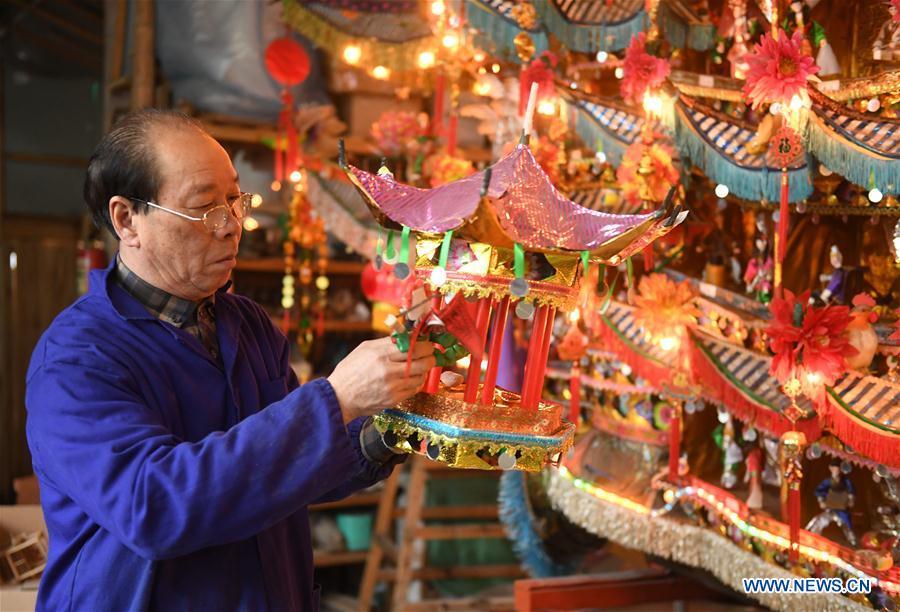
Lin Shunkui looks at his ornamental dragon at home in Beibaixiang Town of Yueqing, east China's Zhejiang Province, Feb. 11, 2019. Having a history of more than 400 years, the ornamental dragon, a sacrifice to pray for good fortune during the period of Lantern Festival, is popular in villages of Yueqing City in Zhejiang Province. Lin Shunkui, an inheritor of the handicraft of ornamental dragon, is born in 1956 in Dongchan Village of Beibaixiang Town. Learning the art since he was young from his father, who is a master of fine paper-cutting, Lin has been in the walk for more than 40 years and has been famous for his exquisite handicraft. The making procedures of the ornamental dragon require high standards and needs preparation of more than half a year. The craftsman must be proficient in various vocations such as paper-cutting, carpentry, painting and machinery. Usually having a height of four meters, a length of three meters and a width of two meters, the ornamental dragon displays about 300 figures in more than 80 cabinets, which are driven by gears hidden inside the dragon body. The handicraft of ornamental dragon was listed as one of the national intangible cultural heritages in October of 2014. (Xinhua/Weng Xinyang)
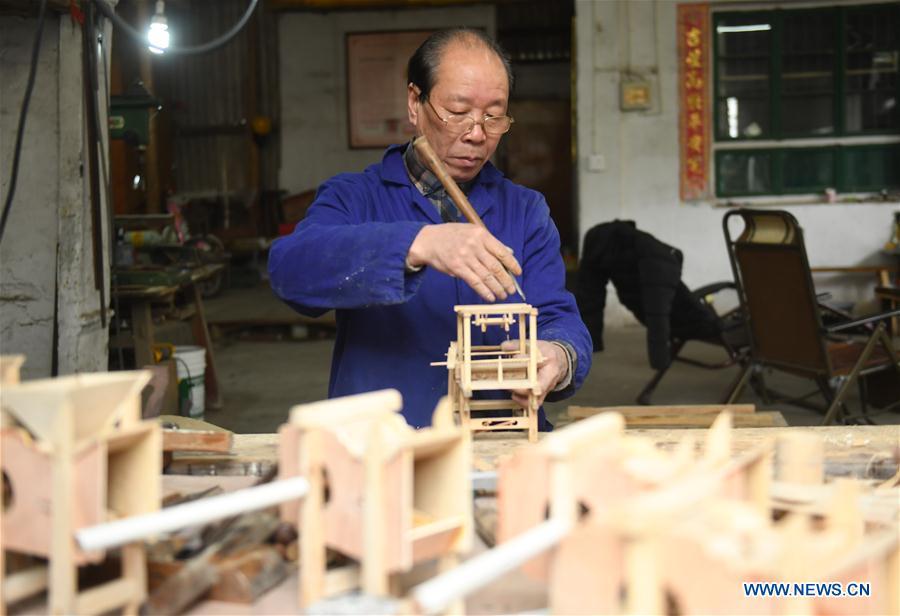
Lin Shunkui shows his tools for making ornamental dragon at home in Beibaixiang Town of Yueqing, east China's Zhejiang Province, Feb. 11, 2019. Having a history of more than 400 years, the ornamental dragon, a sacrifice to pray for good fortune during the period of Lantern Festival, is popular in villages of Yueqing City in Zhejiang Province. Lin Shunkui, an inheritor of the handicraft of ornamental dragon, is born in 1956 in Dongchan Village of Beibaixiang Town. Learning the art since he was young from his father, who is a master of fine paper-cutting, Lin has been in the walk for more than 40 years and has been famous for his exquisite handicraft. The making procedures of the ornamental dragon require high standards and needs preparation of more than half a year. The craftsman must be proficient in various vocations such as paper-cutting, carpentry, painting and machinery. Usually having a height of four meters, a length of three meters and a width of two meters, the ornamental dragon displays about 300 figures in more than 80 cabinets, which are driven by gears hidden inside the dragon body. The handicraft of ornamental dragon was listed as one of the national intangible cultural heritages in October of 2014. (Xinhua/Weng Xinyang)
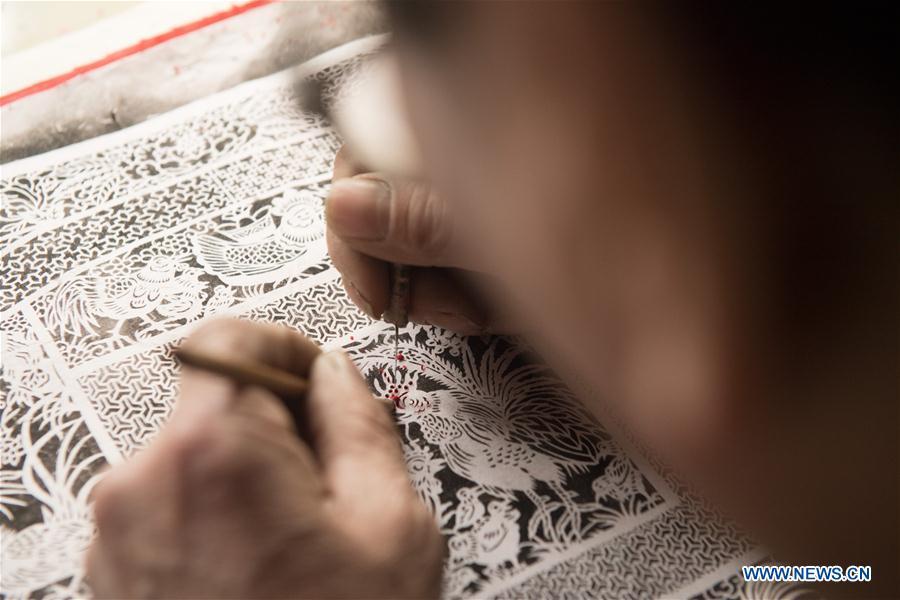
Lin Shunkui shows paper-cutting skills at home in Beibaixiang Town of Yueqing, east China's Zhejiang Province, Feb. 12, 2019. Having a history of more than 400 years, the ornamental dragon, a sacrifice to pray for good fortune during the period of Lantern Festival, is popular in villages of Yueqing City in Zhejiang Province. Lin Shunkui, an inheritor of the handicraft of ornamental dragon, is born in 1956 in Dongchan Village of Beibaixiang Town. Learning the art since he was young from his father, who is a master of fine paper-cutting, Lin has been in the walk for more than 40 years and has been famous for his exquisite handicraft. The making procedures of the ornamental dragon require high standards and needs preparation of more than half a year. The craftsman must be proficient in various vocations such as paper-cutting, carpentry, painting and machinery. Usually having a height of four meters, a length of three meters and a width of two meters, the ornamental dragon displays about 300 figures in more than 80 cabinets, which are driven by gears hidden inside the dragon body. The handicraft of ornamental dragon was listed as one of the national intangible cultural heritages in October of 2014. (Xinhua/Weng Xinyang)











